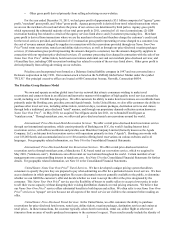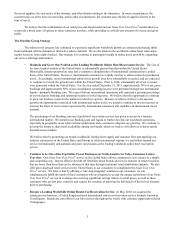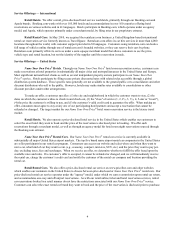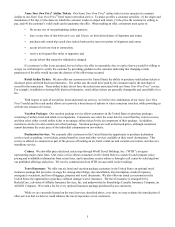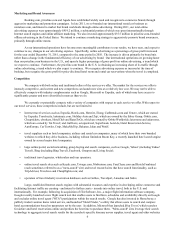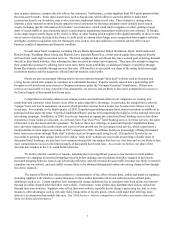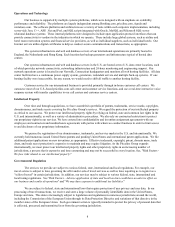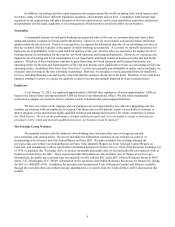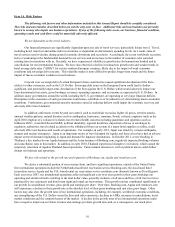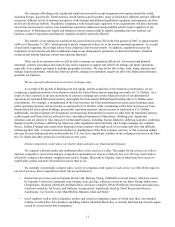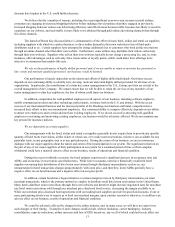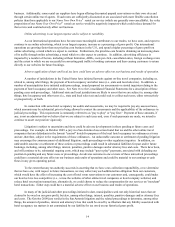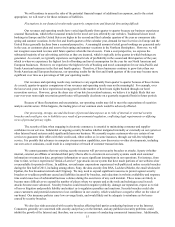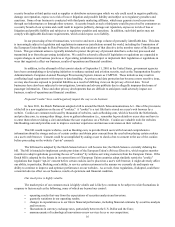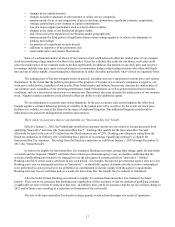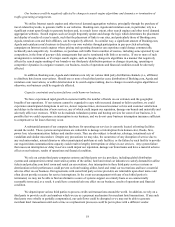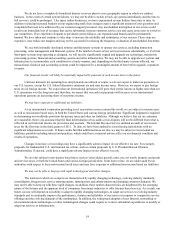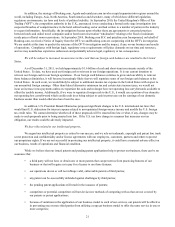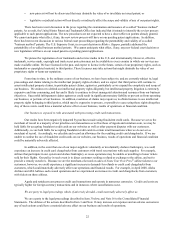Priceline 2011 Annual Report Download - page 13
Download and view the complete annual report
Please find page 13 of the 2011 Priceline annual report below. You can navigate through the pages in the report by either clicking on the pages listed below, or by using the keyword search tool below to find specific information within the annual report.12
• large online portal, social networking, group buying and search companies, such as Google, Yahoo! (including Yahoo!
Travel), Bing (including Bing Travel), Facebook, Groupon and Living Social;
• traditional travel agencies, wholesalers and tour operators;
• online travel search sites such as Kayak.com, Trivago.com, Mobissimo.com, FareChase.com and HotelsCombined
(each sometimes referred to as a "meta-search" site) and travel research sites that have search functionality, such as
TripAdvisor, Travelzoo and Cheapflights.com; and
• operators of travel industry reservation databases such as Galileo, Travelport, Amadeus and Sabre.
Large, established Internet search engines with substantial resources and expertise in developing online commerce and
facilitating Internet traffic are creating - and intend to further create - inroads into online travel, both in the U.S. and
internationally. For example, following its acquisition of ITA Software, Inc., a major flight information software company,
Google recently launched a new flight search tool that enables users to find fares, schedules and availability directly on Google
and excludes online travel agent ("OTA") participation within the search results. Google has also invested in HomeAway, a
publicly traded vacation home rental service, and launched "Hotel Finder," a utility that allows users to search and compare
hotel accommodations based on parameters set by the user. In addition, Microsoft has launched Bing Travel, which searches
for airfare and hotel reservations online and predicts the best time to purchase them. "Meta-search" sites leverage their search
technology to aggregate travel search results for the searcher's specific itinerary across supplier, travel agent and other websites
and, in many instances, compete directly with us for customers. Furthermore, certain suppliers limit OTA participation within
the meta-search results. Some meta-search sites, such as Kayak.com, which offers its users the ability to make hotel
reservations directly on its website, may evolve into more traditional online travel sites. These initiatives, among others,
illustrate a clear intention to more directly appeal to travel consumers by showing consumers more detailed travel search
results, including specific information for travelers' own itineraries, which could lead to suppliers or others gaining a larger
share of search traffic or may ultimately lead to search engines maintaining transactions within their own websites. If Google,
as the single largest search engine in the world, or Bing, or other leading search engines refer significant traffic to these or other
travel services that they develop in the future, it could result in, among other things, more competition from supplier websites
and higher customer acquisition costs for third-party sites such as ours and could have a material adverse effect on our
business, results of operations and financial condition.
Several major hotel companies, including Choice Hotels International, Hilton Worldwide, Hyatt, InterContinental
Hotels Group, Wyndham Hotel Group and Marriott, have launched Room Key, a hotel search engine that competes directly
with our hotel room night reservation services. The hotel companies that own Room Key have a stated goal of driving demand
directly to their brand web sites, thus reducing the share received by online travel agencies. They may also attempt to improve
their competitive position by offering lower room rates, better room availability or additional features or amenities through
Room Key than are available through services like ours. If Room Key is successful, our share of the online hotel room night
reservation market could be negatively affected and our business could suffer.
Hotels are also increasingly offering hotel room reservations through "daily deal" websites such as Groupon and
Living Social, which sell coupons to customers at a substantial discount. Expedia recently entered into a partnership with
Groupon to sell hotel room reservations to Groupon customers under the "Groupon Getaways" brand name. If these new
services are successful, we may experience less demand for our services and are likely to face more competition for access to
the limited supply of discounted hotel room rates.
Competition in domestic online travel remains intense and traditional online travel companies are creating new
promotions and consumer value features in an effort to gain competitive advantage. In particular, the competition to provide
"opaque" hotel services to consumers, an area in which priceline.com has been a leader, has become more intense over the
recent past. For example, in the fourth quarter of 2010, Expedia began making opaque hotel room reservations available on its
principal website under the name "Expedia Unpublished Rates" and has been supporting the initiative with a national television
advertising campaign. In addition, in 2009, Travelocity launched an opaque price-disclosed hotel booking service that allows
customers to book rooms at a discount. As with our Name Your Own Price® hotel booking service, for these services, the name
of the hotel is not disclosed until after purchase. We believe these new offerings, in particular Expedia Unpublished Rates,
have adversely impacted the market share and year-over-year growth rate for our opaque hotel service, which experienced a
modest decline in room night reservations in 2011 compared to 2010. In addition, hotels are increasingly offering discounted
hotel room reservations through "daily deal" websites such as Groupon and Living Social. If Expedia or Travelocity are
successful in growing their opaque hotel service and/or "daily deal" websites are successful in garnering a sizable share of
discounted hotel bookings, we may have less consumer demand for our opaque hotel service over time and we are likely to face
more competition for access to the limited supply of discounted hotel room rates. As a result, we believe our share of the


